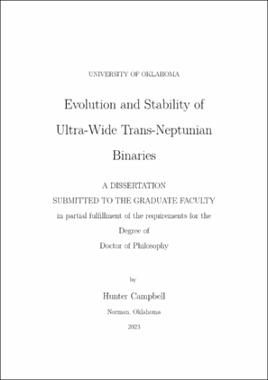| dc.contributor.advisor | Kaib, Nathan | |
| dc.contributor.author | Campbell, Hunter | |
| dc.date.accessioned | 2023-08-01T14:07:24Z | |
| dc.date.available | 2023-08-01T14:07:24Z | |
| dc.date.issued | 2023-08-04 | |
| dc.identifier.uri | https://hdl.handle.net/11244/338756 | |
| dc.description.abstract | This research is focused around the longevity and formation of a class of binaries in the Kuiper Belt called Ultra-Wide Trans-Neptunian Binaries (Ultra-Wide TNBs). The presence of these seemingly fragile binary systems has been used to constrain various properties in both the modern Kuiper Belt and its primordial origins. By studying the evolution and potential formation of these binaries, even more can be learned and some things can be reassessed.
Using the SWIFT Regularized Mixed Variable Symplectic (RMVS) n-body integrator, we simulate the evolution of a number of binary systems perturbed by both collisions and gravitational perturbations. We show that Ultra-Wide TNBs like 2001 QW322 and 2000 CF105, which had previously been seen as stable, are unlikely to have formed in the primordial Kuiper Belt and remain intact into the modern day. We also show that these same binaries can be formed by the gradual widening of initially tighter binaries under the same perturbations. These widened binaries bear properties consistent with observations and are produced efficiently enough to explain their present day population size.
If some Ultra-Wide TNBs are not primordial, then metrics using their survival to constrain the Size Frequency Distribution (SFD) of the Kuiper Belt are not effective. If Ultra-Wide TNBs are primarily formed through widening, their population size can be used to constrain this SFD, and the mass of the initial Kuiper Belt. In addition, the presence and formation of blue Ultra-Wide TNBs in the Cold Classical Belt can indicate the nature of Neptune's migration in the early Solar System. | en_US |
| dc.language | en_US | en_US |
| dc.subject | Kuiper Belt, Binary, Ultra-Wide TNB | en_US |
| dc.subject | Physics, Astronomy and Astrophysics. | en_US |
| dc.subject | Kuiper Belt | en_US |
| dc.subject | Ultra-Wide TNB | en_US |
| dc.title | Evolution and Stability of Ultra-Wide Trans-Neptunian Binaries | en_US |
| dc.contributor.committeeMember | Kilic, Mukremin | |
| dc.contributor.committeeMember | Wisniewski, John | |
| dc.contributor.committeeMember | Peter, Barker | |
| dc.contributor.committeeMember | Kuver, Sinha | |
| dc.date.manuscript | 2023-07-28 | |
| dc.thesis.degree | Ph.D. | en_US |
| ou.group | Dodge Family College of Arts and Sciences::Homer L. Dodge Department of Physics and Astronomy | en_US |
| shareok.orcid | 0000-0002-5484-3076 | en_US |
